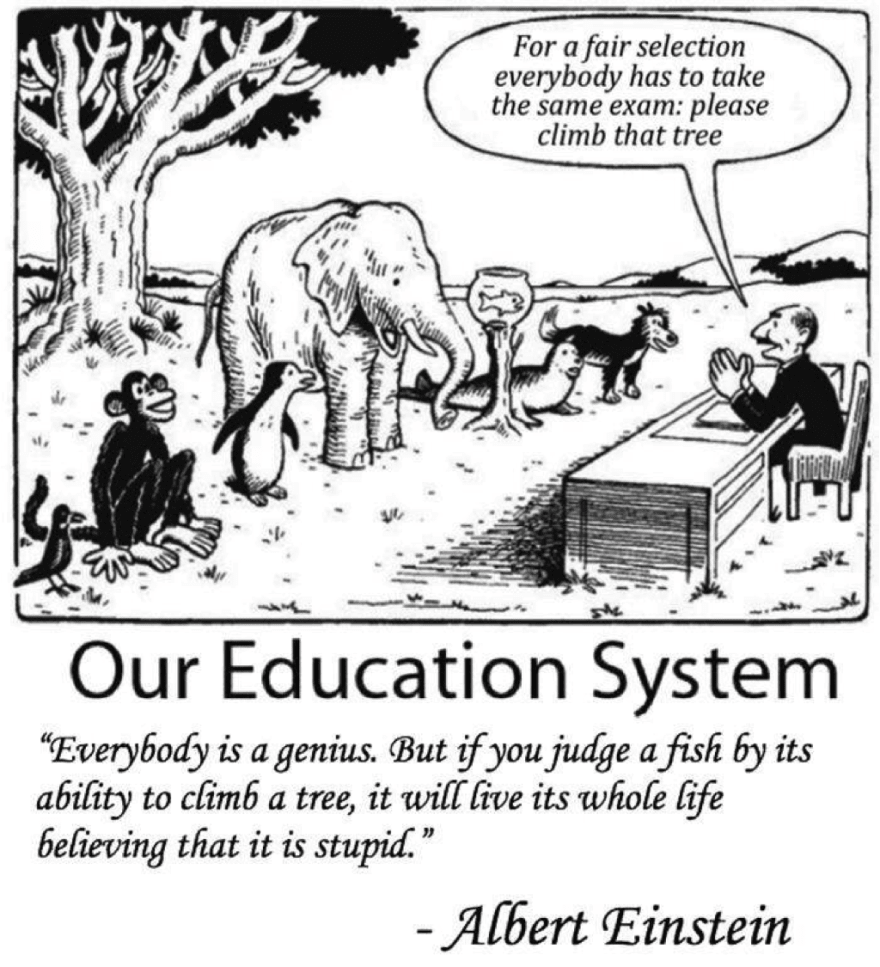Why I Stopped Interviewing With Companies That Require A Coding Test
Original Posted on Feb 2: https://dev.to/bradstondev/why-i-stopped-interviewing-with-companies-that-require-a-coding-test-2j6n
You may be familiar with a famous quote thats has been attributed to Albert Einstein:
"Everyone is a genius. But if you judge a fish by its ability to climb a tree, it will live its whole life believing that it is stupid."
Now there is some debate if Einstein actually said or wrote this BUT the wisdom, nonetheless, rings true:
If you judge everyone by the same metric, there is a chance that you may not get an accurate measure of success.
Sadly, during my 7+ years working as a professional developer in the tech industry, I have seen a metric used to measure developer and programmer success that in MOST cases does not match the actual skills needed to be successful.
And if you have at any point attempted to apply for a job or interview for a position, there is a STRONG possibility you have encountered this metric; Coding Tests.
Coding tests come in several different forms but at their core, their goal is to test your proficiency with computer science principles, algorithms, and general CS knowledge. Coding tests can be delivered in-person on a whiteboard, virtually in a coding sandbox environment or in live-virtual environment where an interviewer asks you to share your screen and watches you work.
Fundamentally, coding tests are non-problematic. They are just a tool to measure a developer or programmer's competency and can be administered to most any job applicant fairly consistently.
But as with any tool, when used inappropriately or without the proper understanding of its usefulness, they can do more harm than good.
So let me briefly summarize why I no longer interview with companies that require a coding test.
NOTE: I am specifically using the word "REQUIRE" as I do not have an issue with a company that uses coding tests as one of their many metrics to evaluate candidates. I am particularly talking about companies that evaluate all technical developer/programming candidates via a coding test and DO NOT have an alternative option for a coding test in place.
1. It Shows a Lack of Care or Concern
So I can understand in the grand scheme of things why coding tests are useful. They allow a hiring team to quickly screen a large amount of candidates and gives a fairly easy metric to judge candidates by. It it by no coincidence that most very large tech companies use them in their initial stage of the interviewing process as a means to weed out "low competency" candidates.
But it is this EXACT reason that coding tests being a requirement in an interview process shows a lack of care or concern. It shows that the goal in this interview process is to weed out candidates, regardless of their wholistic strengths.
It doesn't matter if the candidate is a self-taught programmer, a high-performing developer who has worked in the industry for decades, or a college student pursuing their first opportunity, coding tests only evaluate you on a single metric. And if you have spoken with many recruiters or HR professionals at some of the bigger companies, it acts as the ultimate gate keeper to opportunities.
Being a tech professional who has been interviewee, interviewer, and sometimes just observed technical interviews, I have found that coding tests can be used to invalidate a developers experience and skill in an instance.
I have watched as EXTREMELY competent coder crumble when they were given a coding question that they struggled to answer and that I later found out, the interviewer didn't know how to solve. The interviewer simply went online found common coding questions and presented them to candidates. Luckily, I was able to participate in the interview and"intervened". This particular story ended up having a happy ending but not every interview will have an"observer" associated to it.
I have personally been in interviews where I have done stellar on all technical questions related to the actual role (as explicitly stated by the interviewers in the process) but was no longer considered a viable candidate because I had a hiccup trying to solve an esoteric algorithm coding question that would NEVER be used on the job.
Personally, a coding test requirement in the interview process indicates to me that an employer and an hiring team aren't really in touch with what makes a quality developer and how to measure actual success. But are looking for any easy way to comb through candidates and minimize interactions with candidates until they are further down in the process.
2. Some Candidates are at a Massive Disadvantage
This point personally hits home for me, but there are circumstances that can make a coding test extremely unfair to candidates looking for an opportunity at a company.
Imagine we threw away everything I said in my first point. Imagine that all coding tests were administered by hiring professionals and teams that genuinely cared about their prospective candidates. Even if the hearts of every interviewer and person in the hiring process was absolutely pure, coding tests would still put an undue burden on otherwise competent and valuable candidates.
How so?
Well it comes down to the fact that some people are ALWAYS going to perform badly in a code "testing" setting. May it be someone with a learning disability, an individual with forms of anxiety that affect testing performance, or someone who's background makes the testing material extremely difficult. And know, this is not an exhaustive list but a representative list of limiting factors to coding test performance.
Sadly for me, I've ALWAYS struggled in high pressure testing environments (ask my college GPA about that 😅) and I've also struggled with coding tests because as a self-taught programmer, things like algorithms and CS concepts are something I didn't really encounter until later in life.
Because of those factors, it makes coding tests extremely difficult. Even in coding tests where I have done "okay", it still didn't feel good. And though I have always performed extremely well at any role I have ever had the opportunity to work in, a coding test metric would show me, in most cases, as absolutely incompetent.
There was one occasion where I was going through an interview process and performed will at almost every stage. At the very end of the process, the recruiter was giving me amazing feedback and was about to end the interviews for the day. (NOTE: This was an on-site multi-hour interview.) As I was heading out, I was asked if I'd be willing to do an"extra"interview with one of the"higher-ups"in the company and I was fine with that. What I didn't know, was that they were going to administer a "test" to me. Within the course of 15-minutes, I lost the job. My anxiety destroyed me. EVEN THOUGH, I was found to be competent and qualified by others in the process, my failure of this one "test" ended my chances.
That was a very personal experience, but I have a feeling that I may not be the only person who has been summarily disqualified from a position because of a poor performance on a test (some which don't even cover skills that would be used on the actual job).
3. It's Not Worth It!
I have a personal conviction when it comes to interviews, that goes like this:
"You already know what you know, No need to prepare!"
Once again this is a personal conviction (which I don't expect anyone else to have) so my personal mentality with interviews has always been to do no extra preparation other than maybe reviewing what I already know (and brushing my hair and looking presentable 😅). I want interviewers to have the most honest reflection of my skills. I want them to see me as I would be if I worked for them on a daily-basis.
I have on multiple occasions in the past been told I need to "study for this interview". I would then be sent a set of links or a PDF on how to prepare for this interview and necessary skills I need to learn to "pass" it.
When I was looking for my first job in the industry and I had almost no experience or knowledge that I could exemplify in a demonstrable way, I kind of got it. Companies need to know that I can learn and that I'm willing to take challenges, so fair-play. But interestingly enough, I got my first job in the industry without having to study or take an explicit test; They did test my knowledge but it was relative to the job role itself.
Now, as an experienced professional, I personally refuse to study for a job interview for skills that I will not use on the job. It's just not worth it.
With the busy-ness of life and the difficulty of finding time to study with a full-time job, in most cases, I have been asked to study concepts and materials that I almost never have and never will use in my day-to-day. There is a good chance that after I pass the test that I may NEVER use the knowledge I studied for in a meaningful way when I do land the job.
I have from time-to-time contemplated maybe studying for a coding test and then realized I'd rather spend my time learning skills that I will most likely use in the future. It many ways, I feel that asking to study for a job interview should not be the standard. You should be evaluating the candidate based on their current skill, not on a skill that they don't currently possess.
Now, at the end of the day, this is all my personal opinion and comes from my time in the industry but I'd love to hear other people's thoughts. I am not completely against "coding tests" per-say, but I do feel that they are overused and/or misused in the tech industry. At a minimum, I think there should always be an alternative to a coding test OR that it should NOT be used as a "gate-keeping" mechanism in the interview process. If anything, just like behavioral tests that are given during some job interview processes, it should be used as a frame of reference, not the deciding factor.
So do ya'll think coding tests are worth it? Do you disagree with my opinion/take on the matter? Did I get something wrong or make a point that doesn't make much sense?
Please let me know below in the comments. I'd love to hear your thoughts!
Thanks for reading, my friends,
Bradston Henry
\===CREDITS===
Cover Photo: Monstera from Pexels
Education System Photo: Unknown
Woman Shrugging Photo: Polina Zimmerman from Pexels
Disappointed Woman Photo: Andrea Piacquadio from Pexels
Man's Smartwatch Photo: cottonbro from Pexels
https://dev.to/bradstondev/why-i-stopped-interviewing-with-companies-that-require-a-coding-test-2j6n



